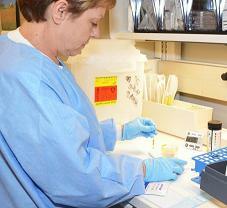 Urobilinogen (mesobilirubinogen) - a product of bilirubin reduction. The latter is a bile pigment formed by the breakdown of proteins containing heme.
Urobilinogen (mesobilirubinogen) - a product of bilirubin reduction. The latter is a bile pigment formed by the breakdown of proteins containing heme.
Thus, urobilinogens arise as a result of the utilization of erythrocytes. Urolilinogen is formed in conditions of the intestine from bilirubin, which got there together with bile. Under the influence of enzymes and microorganisms, it is oxidized and absorbed again into the blood. After that, it enters the kidneys and is excreted along with the urine.
If urobilinogen in the urine is elevated, and its concentration exceeds 10 mg / ml, it is said about hyperurobilogenuria. This condition may be a consequence of a violation of the reuptake of urobilinogen by hepatocytes, an increase in the synthesis predecessors urobilinogenovyh bodies - bilirubin, as well as increase its level of absorption in the intestine. What this means we will consider in this article 34.
What it is?
Obtained urobilinogen in the intestine from the bilirubin (in this process takes part intestinal flora). Part of the substance is converted into sterkobilinogen, which is excreted together with feces, and the second part is absorbed by blood.Blood mainly passes through the liver, due to which its cells capture urobilinogen and again convert it to bilirubin, which is already excreted along with bile. However, a small part of the blood passes from the intestine to the hemorrhoidal anastomoses, without capturing the liver. That is, a certain amount of urobilinogen still falls into the urine.
The norm of urobilinogen in the urine
Urohibin in the urine of healthy people should be kept in scanty norms. It is so small that tests show negative results. Hence it is clear that in the normal state of urobilins in the urine should not be detected.
However, in the urine of an adult person, at least traces of urobilinogen must be detected.
His complete absenceit is possible in three cases:
- The process of renal filtration in severe form of glomerulonephritis, toxic kidney damage and malignant neoplasms is disrupted.
- Bile does not leave the gallbladder into the intestine due to mechanical blockage of the bile duct.
- An obstruction may be a stone or a compression of the duct with the head of an enlarged pancreas or a tumor.
Graduationby the degree of increased level of urobilinoids:
- weakly positive (+);
- positive (++);
- sharply positive (+++).
To determine the urobilin levels in urine is important, because the indicators can be used to judge how effective the urinary system is. Excess of the norm of urobilinoids is called urobilinuria. This enzyme is increased when the liver or intestine is broken.
Causes of elevated urobilinogen in the urine
In the urine, an urobilinogen was found, what does it mean? An increase in the concentration of urobilinogen in the urine of men and women may indicate an excessive production of bilirubin in the liver or a slowdown in its utilization. Similar symptoms often occur with liver pathologies. Another cause of this condition may be the process of destruction of erythrocytes in the body (hemolysis).
Let's list the main reasons, as a result of which it is diagnosedhigh urobilinogen content in the urine:
- Increased catabolism of hemoglobin: hemolytic anemia, intravascular hemolysis (transfusion is incompatible blood, infection, sepsis), pernicious anemia, polycythemia, resorption of massive hematomas.
- Increased urobilinogen formation in the gastrointestinal tract: enterocolitis, ileitis, intestinal obstruction, increase in the formation and reabsorption of urobilinogen in infections of the biliary system (cholangitis).
- Increase in the violation of liver function: viral hepatitis (excluding severe forms), chronic hepatitis and cirrhosis of the liver, toxic liver damage (alcohol, organic compounds, toxins in infections and sepsis).
- Secondary liver failure: after myocardial infarction, cardiac and circulatory insufficiency, liver tumors.
- An increase in liver shunting: cirrhosis with portal hypertension, thrombosis, obstruction of the renal vein.
In some situations, the increase of this indicator above the norm is not associated with liver pathology, and can arise because of insufficient intake of fluid, or its excessive excretion. In this case, the pigment content remains unchanged, and its concentration increases solely at the expense of fluid loss.
Treatment
Urobilinogen in urine - what does it mean? What to do in this situation? First of all, do not panic. Negative emotions and emotional imbalance lead to stagnant phenomena in the body, which will further exacerbate the situation. When abruptly reacting to urobilin bodies, it is necessary to consult a doctor and it is possible to undergo additional studies that will help to find out the true cause of this situation.
Once the exact results are obtained, you must necessarily revise your diet and choose the appropriate diet regime that will be gentle for your liver. Do not forget about the day regimen, remember that the greatest activity of the liver is for a period of time from 21.00 to 3.00, but only if you are in an absolutely calm state, that is - sleep. To put in order the work of your body, wake up no later than 7 hours, and go to bed - no later than 22.
Infusions of medicinal herbs will also help to bring the body back to normal, to regulate the intestines and to remove excess slag. This bitter herbs, for example, immortelle, wormwood, elecampane, tansy, milk thistle. To prepare medicinal infusion, take one large spoonful of dry raw material of any of the listed herbs and pour 0.5 liters of boiling water, insist for at least half an hour, then filter. Take should be before eating for 1/4 cup.

How to choose probiotics for the intestine: a list of drugs.

Effective and inexpensive cough syrups for children and adults.

Modern non-steroidal anti-inflammatory drugs.

Review of tablets from the increased pressure of the new generation.
 Antiviral drugs are inexpensive and effective.
Antiviral drugs are inexpensive and effective.



